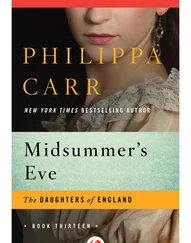“You … use that?” I asked.
“On stage,” she replied, her eyes downcast and her mouth, which she did not seem to be able to control, showing some amusement. “We have to look larger than life on stage, otherwise those in the back row would not see us. So we make ourselves as colourful as possible.”
“I like hearing about the players,” said Madame Lambard. “What a wonderful life you must have.”
Again that wry quirk of the lips. I thought for the first time: She is not what she seems.
How we petted her! Marianne and Jeanne made special dishes for her; Jacques enquired for her. Madame Lambard came in three times during the first day to change the poultice; the children peeped in to talk to her and it was difficult to get them away. Lucas clearly adored her, and as for myself I was fascinated too.
She was aware of this. She lay back on her pillows and clearly reveled in her position.
What seemed strange to me was that she did not seem to be very disturbed that the company should have left her behind. I supposed that she was so worldly that she was quite capable of making the journey alone when the time came to join them. I was very innocent.
The next day she told us she still could not put her foot to the ground without suffering great pain, although while she rested it, it did not hurt. So we continued to dance attendance on her and treat her like an honoured guest and it did not occur to me that she was deceiving us, but on the third day I made a discovery.
The children had gone riding with Lucas. I had decided at the last minute not to go with them. Jacques was cutting up wood for the Lambards, Marianne and Jeanne were in the kitchen concocting some special dish for Harriet, and I decided that I would go up to see her.
I knocked at the door and there was no answer, so I quietly pushed it open and looked in. The bed was empty though rumpled. Harriet’s clothes were there, but where was she?
I could not understand it. A horrible desolation came over me. She had left us. How dull it would all seem now! But how could she have gone without her clothes? No. She was somewhere in the castle. But where? And how could she have left her room when she could only hobble in the utmost pain?
She had tried to walk. She had fallen. She was lying somewhere in pain. I must find her, for she must be here. She could not have left the house without her clothes.
As I stood there, my hand on the door, I heard light, running footsteps and they were coming towards this room.
My heart started to pound as I went into a dark corner of the room and stood very still there, waiting.
Harriet came running in. There was no sign of a hobble. She tripped round the room, pirouetted on her toes, and then looked at herself in the mirror which stood on the table.
She must either have sensed my presence or caught a movement in the mirror, for she spun round as I emerged from the shadows.
I said: “Your ankle is greatly improved.”
She opened her eyes very wide. Then she shrugged her shoulders.
“Well” she said, sitting down on the bed and smiling benignly at me, “it was never very bad. Though I did twist it. I slipped on the stairs. Then when it was a little swollen the idea came to me.”
I should have been warned that anyone who could show such little concern at being found out in a deception like this must have been in a similar situation before.
She smiled at me appealingly. “I so much wanted to stay,” she said.
“You wanted to stay here … when …”
“It’s comfortable,” she said. “More so than some dirty old inn, some poor lodging, not enough food because we can’t pay for it … Oh, much better than that.”
“But your Paris engagement …?”
“Our hopes of a Paris engagement. Do you think they would want us … a poor company of strolling players … in Paris!”
“But Monsieur Lamotte said …”
“Monsieur Lamotte has his dreams. Don’t we all? And it is nice to think they are realities. It’s a trick people have … particularly actors.”
“Are you telling me that you pretended to hurt your ankle so that you could stay here?”
“I did hurt my ankle and when I woke up warm in my bed … your bed shall we say … I thought: I wish I could stay here … for a little while. I wish I could talk to the interesting Arabella and become her friend, and be loved from afar by the adorable Lucas and bask in the admiration of the delectable babies …”
“You are talking like Monsieur Lamotte.”
“That’s because I am … or was … one of his players.”
“Are you going to join them now that you have discovered that you can walk quite painlessly?”
“It depends on you.”
“On me!”
“Certainly. If you decide to turn me out I shall join them. I shall tell them that the rest I have had and the ministrations of the good Madame Lambard have cured me. But I shall only do that if you turn me away.”
“Are you suggesting that you should stay here?”
“I have been thinking of it. Young Master Dick has been telling me of a very estimable lady who has, alas, gone to her Maker—Miss Black whose name is spoken with awe. She was the governess and it is a great misfortune that they are now without that one so necessary to their future.”
“I have been teaching them. Lucas has helped me.”
“That is admirable, but you have your duties about the château. Lucas is too young and has scarcely finished his own schooling. You need a governess. If you decided to engage me I should do my utmost to give satisfaction.”
“A governess? But you are an actress.”
“I could teach them literature. I am well versed in that. … I know the plays of England and France by heart … or some of them. I could teach them to sing … to dance … to carry themselves as they should. I could really supply a finish to their education.”
“Do you really mean that you want to stay here in this quiet, dull, old château !”
“Where there is good fire to warm myself, good food to fill myself and a certain companionship which I feel could become important to me.” She was looking at me earnestly, almost pleadingly. “Well, Arabella, I see you are the one who makes decisions here. What is your answer?”
I said: “You know I would never turn anyone away who needed shelter.”
Her smile was dazzling. I felt I wanted to keep looking at her as well as listening to her. Of course I wanted her to stay. Of course I was delighted that she had suggested it, even though I was a little shocked that she had pretended so convincingly, but then she was an actress.
When I told the children that Mistress Main was to be their new governess, Dick set the young ones leaping high into the air—their special way of conveying approval. Lucas thought it would be good for the children and that our parents would be pleased. I was not so sure of the latter and made up my mind that I should not tell them that Harriet had been a player before she had decided to become a governess—not until they had seen her for themselves that was, and had, as I was sure they would, succumbed to her charm. Jeanne, Marianne and Jacques were pleased to have a new excitement brought into their lives. Madame Lambard could not but approve of one who had so rapidly shown the efficacy of her cures.
And so Harriet Main settled in our household.
It changed at once as I had known it would. Even her clothes were different. She had dresses of brocade and velvet which looked wonderful in candlelight. The children thought her beautiful, which in a strange, exotic way she certainly was. They could not take their eyes from her. Lucas was ready to be her slave, but I was the one she wanted most to impress.
Читать дальше












